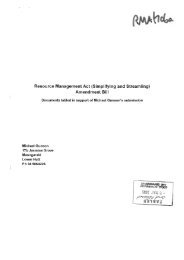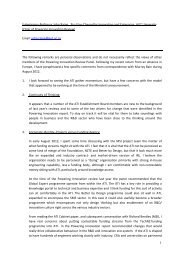Parliamentary Debates (Hansard) - New Zealand Parliament
Parliamentary Debates (Hansard) - New Zealand Parliament
Parliamentary Debates (Hansard) - New Zealand Parliament
Create successful ePaper yourself
Turn your PDF publications into a flip-book with our unique Google optimized e-Paper software.
16 May 2009 Local Government (Auckland Reorganisation) Bill 3665<br />
test, would have been much more frivolous than these amendments. On the standards of<br />
frivolity, these amendments cannot be ruled out.<br />
The point I will go back to is that it is my submission to you that the judgment of my<br />
friend and colleague the Chair of the Committee Rick Barker in this particular case is<br />
wrong because he has gone to the merits of whether it is appropriate to grant a private<br />
right by way of a public bill. There is nothing that prevents this <strong>Parliament</strong> from doing<br />
that. People might think it is wrong. People might not like it, but my submission is that<br />
for groups of people it happens all the time. When we have bills that deal with local<br />
authority matters it happens quite regularly that groups of individuals gain, and other<br />
groups of individuals lose. I will go back to the point about the substance that the rights<br />
are not transferable rights.<br />
As a final point I say that the Chairman made a very good argument on the<br />
specifics—one that I might even find rather compelling, if I were considering it<br />
carefully—but it is not the basis on which items should be ruled out.<br />
Hon GERRY BROWNLEE (Leader of the House): I think it is very interesting<br />
that part of the argument advanced by the Hon Trevor Mallard is some assessment<br />
against a frivolity scale. We should remember that this proposed new part that Labour is<br />
attempting to insert is to protect the assets of the citizens of Auckland. To then amend it<br />
to protect the interests of residents in particular roads I think trivialises the point of the<br />
part in the first place. In all other respects—not wishing to prolong proceedings—I<br />
think the Chairman of the Committee, Rick Barker, outlined extremely well for the<br />
House why he was choosing to rule these amendments out of order. I am sure you will<br />
have noted the comments he made in his address to you, in which he was explaining<br />
why he had reached this conclusion. Without wanting to prolong proceedings I simply<br />
want to say that we concur wholeheartedly with his decision, and accept fully the<br />
rationale he has applied.<br />
Hon DAVID PARKER (Labour): I think the judgment you have to make as<br />
Speaker in this situation must take into account the context in which this debate is being<br />
held. It is pretty clear from the conduct of the Committee that the Opposition is trying to<br />
delay progress—we are trying to filibuster this bill—and that the Government wants to<br />
bring the debate to an early end. I want to cause the Speaker to reflect on the fact that<br />
the fourth estate has actually been commenting on whether this filibustering is an abuse<br />
of parliamentary process. I suggest that it is not. It is already clear that although the<br />
progress that has been made on this bill is slower than the Government might like, none<br />
the less it is substantial.<br />
This bill has been considered under urgency, and even at the current rate of slow<br />
progress it is very clear that this bill will be completed in accordance with the<br />
Government’s agenda within a week, which is far, far quicker than would be the normal<br />
process were it not for urgency. It is the right of the Opposition to use the Standing<br />
Orders to filibuster. Filibustering does not bring this place into disrepute. It is not an<br />
abuse of process. It is not frivolous. We are using the rights we have as parliamentarians<br />
in the Opposition to slow down the progress the Government wants to make under<br />
urgency. I make the point again that substantial progress has been made. I do not think<br />
anyone thinks this debate will go on for weeks or anything like that. This is the only<br />
opportunity we have to scrutinise the bill. Many other jurisdictions use filibustering. We<br />
have a practice now whereby we do not get even to the end of debate where new points<br />
are being raised on proposed new parts, yet closure motions are taken. It is completely<br />
appropriate that the Opposition be able to filibuster this bill.<br />
Mr SPEAKER: I thank honourable members. Dealing with the previous<br />
contribution first, the Speaker may well have views about whether filibustering is taking<br />
place and whether time is being wasted, but those views should not in any way






![Full evidence text [PDF 8908k] - New Zealand Parliament](https://img.yumpu.com/14025494/1/184x260/full-evidence-text-pdf-8908k-new-zealand-parliament.jpg?quality=85)
![−3 JUN 2009 IRELEASED] - New Zealand Parliament](https://img.yumpu.com/12829724/1/185x260/3-jun-2009-ireleased-new-zealand-parliament.jpg?quality=85)
![Full paper text [PDF 3515k] - New Zealand Parliament](https://img.yumpu.com/11267192/1/184x260/full-paper-text-pdf-3515k-new-zealand-parliament.jpg?quality=85)


![Full evidence text [PDF 9k] - Parliament](https://img.yumpu.com/7938085/1/184x260/full-evidence-text-pdf-9k-parliament.jpg?quality=85)





